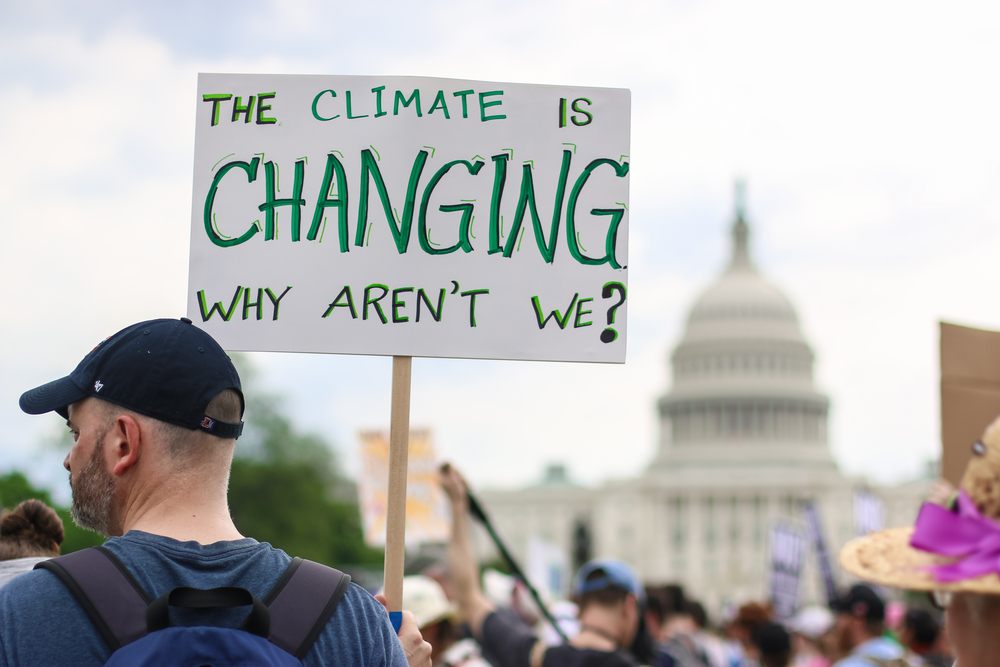Blockchain Can Make Climate Action Work!

When Greta Thunberg went to the United Nations Climate Change Summit 2019 meeting, she was the smallest and youngest person in a room full of world leaders. By the end of her speech, she came off as the oldest person in a room full of world leaders.
She was brushing off climate change skeptics for their talking points, and supporters for making empty promises. Her manner was level and unflinching. But her raw honesty around the message of climate change undeniably points to the need for the implementation of practical actions and policies that will shift the global response.

Climate change challenges and blockchain opportunities.
Don’t bet on the United Nations to pass a resolution that will fix climate change. Here’s why. The United Nations Framework Convention on Climate Change (UNFCCC) was created in the face of worsening climate conditions to limit the effects of greenhouse gases. The result was the Kyoto Protocol, and two agreements, Cancun and Paris. More than 190 nations signed up to the latter, to implement a comprehensive plan to limit global warming to a two-degree Celsius threshold.

However, instead of reducing greenhouse gas emissions, they continue to increase. In fact, GHG is 60% high than they were in 1994. Emissions are on the rise in almost all countries, including developing countries which promised to reduce emissions. The world is moving past madness and into insanity. World leaders are completely oblivious about the future of our planet, following in the footsteps of President Trump, who’s exceptionally ignorant.
Today, more than any other day, there’s a greater urgency to address the climate change problem — the progress made by the UNFCCC fall short of these goals. Furthermore, moving from a legally binding Kyoto Protocol to a voluntary Paris Agreement casts a question mark over the potential to deliver results in the future. The United States withdrew from the Paris Agreement in June 1st, 2017, and other big polluters are expected to follow suit, further weakening the Paris climate rulebook.
The fact is that the fight to save planet Earth needs actions from all nations, levels of government, private sectors, and civil society. Moreover, hard emission targets and a roadmap for transition in all areas are needed. But, this can only happen if the world adopts a radical new strategy to combatting climate change.
Can blockchain technology boost climate action?

Global warming is a problem in itself. But, it’s compounded when people, especially leaders of nations, lie and deceive the population to hide the problem. Under the Paris Agreement, all countries would bear the cost of climate impacts. They will also mitigate and adapt to climate change. The UNFCCC was reduced to an organization that collects, synthesizes, and disseminates data. There’s no mandate to drive a collective action to fight climate change.
In such a situation, there are two ways to ensure the continuation of international efforts to fight global warming. First, it requires multiple sectorial and regional platforms for rapid transition in energy, transport, agriculture, and industries like steel. Second, engaging the private sector by making it their fiduciary duty to limit climate pollution.
The UN Intergovernmental Panel on Climate Change (IPCC) issued a special report on October 2018, about the impact of global warming of 1.5 C (2.7 F). The report found that limiting global warming to 1.5 C would require immense international efforts that are far-reaching, and will bring unprecedented changes to everything.
Let’s propose blockchain technology. The success of blockchain has led the technology to be touted as a solution to many problems facing various industries. For instance, blockchain has been portrayed as a means to finding the cure to cancer and legitimizing the black market trade within the prison system in the US. As a result, there’s a lot of faith in the technology, to deliver a lasting solution to the climate change problem.
Compared to the ceiling set by the Paris Agreement of 2 C, 1.5 C will ensure greater sustainability and equitability. For example, rising global sea levels would be 10 cm lower with global warming at 1.5 C compared to 2 C. Thus, the Paris Agreement alone won’t save the world. The future depends on much more ambitious and progressive emission monitoring, response, and involvement.
The climate change problem is getting worse, can blockchain serve as a turning point?
Blockchain elements that can address existing and post-2020 climate change needs.

Climate change news are rapidly becoming the most significant global agenda in the 21st century. The reason is the unprecedented implications on how the population of the world will grow food, settle, and build cities in the future. The effects go beyond to affect the functioning of ecosystems for various services. In response, activists are betting on innovative technologies to make the much needed social impacts.
Blockchain technology comes with all the design elements to create a trust machine for decentralization, which will prove paramount for the resilience of an ecosystem to mitigate climate change effects. Here are blockchain elements and digital innovations, which could help address the challenges facing climate change post-2020.
- Decentralized infrastructure. Blockchain technology provides new means for outsourcing infrastructure needs. The arrangement of a decentralized network of computers ends up being more cost-efficient and transparent. Also, the system doesn’t have a single point of failure.
- Encrypted transactions. Data security is no longer an afterthought. Some of the most common ways data can be secured on the blockchain include; breaking information into chunks, encryption, and distribution across networks. The data is distributed across a network with users from all over the world.
- Immutability. The ability of the blockchain to remain permanently indelible. This definitive feature has the potential to transform the accounting and auditing processes into quick, efficient, and cost-effective procedures. That means the cumulative and immutability element of the blockchain will aide in ensuring the security of transactions, and fraud prevention.
- A permissioned blockchain has an additional security system. This security system makes it more secure because they have an access control layer. Therefore, the ability to write and view confidential information can be maintained outside the chain.
- Smart contracts. These self-executing contracts are the blockchain space equivalents of stored procedures in the database world. Therefore, it has access to the internal functions of the blockchain. In other words, a smart contract will define the diversity of units, rules of exchange, and facilitating payments and accounting for environmental good.
- The Internet of Things and Big Data Analytics. By combining independent data analytics, sensor networks, and blockchain technology, mechanisms that generate units for monitoring, reporting, and verify environmental data will be automated, seamless, and efficient. The fact that all the data obtained is recorded on the blockchain means that environmental assets investors will have access to information they can trust.
The UN coalition for future use of blockchain technology.

Unlike any centralized database, blockchain can facilitate the implementation of a framework, which will apply a broader scope on measurements and tracking of core challenges affecting climate change. This is the promise of verifying how nations are progressing in climate change efforts, the benefits of which will go beyond tracking carbon emission. Moreover, businesses and individuals who are familiar with the situation can also contribute to help manage climate change.
The best-well known application of blockchain is acting as a single point of truth, where entries are recorded through a consensus process. Also, there’s the tokenization of real-world assets such as carbon credit and green energy, which can be traded on the platform. Thereby value is created and an incentive to change climate action with nations and industries. This is the application of distributed ledger technology (DLT) and the benefits of which could lead to a significant breakthrough.
At the beginning of 2018, the UN Climate Change Secretariat launched the Climate Chain Coalition to encourage exploration, collaboration, and future use of blockchain technology to enhance environmental integrity. The coalition members cooperate to support and fully optimize blockchain technology and other solutions for addressing climate change. According to the announcement, the coalition came as a result of a meeting with other DLT-focused organizations, which reached an agreement to launch an initiative aligned with the long-term goals set in the Paris Climate Agreement.
As an organization that is committed to fighting for environmental integrity in general, advancing DLT to enhance climate action is a top priority. Hence, the coalition is committed to setting standards, which will support the efficacy of blockchain application to address climate change across mitigation and adoption.
As countries, regions, and cities work on the implementation of the Paris agreement, using innovative technologies become an essential part of reversing climate change. Blockchain technology could lead to greater stakeholder involvement in environmental conservation, transparency of emission data, and trust in the fight against climate change. In a nutshell, blockchain can be tailored to address various climate and sustainability applications.
Blockchain climate change applications and initiatives.

The efforts of the UN exhibit concrete proof that blockchain technology has a significant role to play in the acceleration of global actions towards the Paris Agreement agenda and other sustainable development goals. Some projects are already exploring the potential applications of blockchain technology in climate space. Here are the most promising climate change initiatives summarize below.
Blockchain Climate Institute.
The Blockchain Climate Institute is a volunteer-led think tank that seeks to raise awareness about the potential of blockchain technology to make climate action work. This entity seeks to achieve its mission in three areas; climate finance, transparency framework, and investment flow. The institute also features an impressive line-up of climate change experts on its advisory board.
Blockchain for Climate Foundation.
The Blockchain for Climate Foundation is an ambitious project to put the Paris Agreement on the blockchain. Thereby, all countries can join a single blockchain ledger, where they can transparently record their investments, and contribute to climate action. At the moment, it’s starting with incorporating the Canadian National Carbon Account as a proof of concept, before rolling out a product that will be used internationally for good.
Climate Ledger Initiative.
The Climate Ledger Initiative is also building blockchain-based applications in-line with the Paris Agreement, and Sustainable Development Goals (SDGs). The Government of Switzerland and Liechtenstein are funding this initiative. In December 2018, the group published a paper about blockchain and climate change use cases. These cases included; carbon pricing and taxation, and token-based crowdfunding for climate change and renewable energy efforts.
Challenges that blockchain has to overcome before application in climate change.

Proponents tout blockchain as a revolutionary technology because of its ability to function without a central authority. However, several hurdles need to be addressed, such as;
- Blockchain can’t solve all problems. As with any new and developing technological phenomenon, there are certainly some aspects of blockchain technology that might not make it a good fit for the overall strategy to fight climate change.
- Energy consumption. For example, Bitcoin reportedly has a higher energy consumption than the entire nation of Switzerland, according to a report by the University of Cambridge. Although the reason why Bitcoin consumes so much power has to do with its consensus mechanism (Proof-of-Work), the alternative (Proof-of-Stake) consumes around 25-50% less energy.
- Lack of interoperability. There’s an ever-increasing number of players in the blockchain industry. However, there’s no standard available that allows them all to interact easily with each other; which is called interoperability. The lack of such standards gives developers the freedom to create as many networks with different coding languages, protocols, privacy measures, and consensus schemes. Hence, they can’t communicate without translation.
- Regulatory and governance framework. Regulators have been uneasy about the speculative nature of the cryptocurrency market, and the controversial phenomenon of Initial Coin Offering (ICO). There’s a lot that needs to happen before the significant regulatory hurdles facing the blockchain application can be cleared.
Conclusion.
Blockchain, climate change initiatives are still in their early stages. The fact that there are multiple research-focused initiatives and think tanks is a strong signal that a sustainable future will be blockchain-enabled. As the blockchain industry grows to enable cross-platform transaction, interconnectivity, and standardization, these groups could consolidate into a broader and more important initiative. Upon this realization, the world will be able to see the true potential of blockchain in fighting back climate change. What does the world have to lose?

